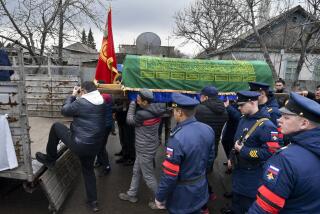Emergency Declared at Uzbekistan Border : Soviet Union: The republic asks Moscow to help end the clashes, which have killed 78 people.
- Share via
MOSCOW — With 78 people now dead in ethnic rioting in Soviet Central Asia, the republican government in Uzbekistan on Friday declared a state of emergency along its border with Kirghizia and called for troops from the Kremlin to end the continuing clashes.
President Islam Karimov of Uzbekistan, appealing to the central government to intervene, warned that tensions are high and still rising and that a serious conflict could erupt between his republic and Kirghizia.
Karimov imposed a state of emergency in the city of Andizhan and five surrounding districts in Uzbekistan in an effort to prevent the clashes from spilling over the border from Osh in Kirghizia, where the fighting erupted five days ago in a dispute over land being allocated for new housing.
Sporadic skirmishes between Uzbeks and Kirghiz continued Friday in more than 30 villages in the three districts around Osh, an Interior Ministry official said in Moscow, as armed bands from both sides maneuvered for positions and sought revenge for those killed in earlier fighting.
Further fighting was reported Friday evening near Uzgen, a district about 35 miles from Osh, and Radio Moscow’s Interfax news service said more people had been killed.
The unrest is some of the worst that has occurred in recent years in Soviet Central Asia, where rising nationalism among ethnic groups in the region, high unemployment and wretched living conditions have created an explosive atmosphere.
Vadim V. Bakatin, the Soviet interior minister, had warned Thursday that a “medieval nationalism” was spreading through the region and that local police are no longer able to prevent inter-ethnic clashes.
Thousands of people, armed with everything from sharpened sticks and stones to handguns and rifles, had lined the border between Kirghizia and Uzbekistan, he said, and were “spoiling to take vengeance for grievances.”
The conflict in the Osh area this week is similar to earlier disturbances in Uzbekistan, Kazakhstan and Tadzhikistan, in which a local dispute flared into days of ethnic clashes. In Osh, the clashes began when crowds of Uzbeks protested a decision by local authorities legalizing the construction of unauthorized housing for Kirghiz on an Uzbek collective farm.
The death toll in the Osh area has now risen to 78, according to the official Soviet news agency Tass, and at least 330 people have been wounded. A total of 249 houses have been burned to the ground in the region.
The state of emergency was declared around Andizhan after more than 15,000 Uzbeks tried to cross the border into Kirghizia on Thursday evening to come to the aid of their relatives in the neighboring republic.
“In Andizhan and surrounding areas, people from other parts of Uzbekistan kept coming with demands to be taken to Osh to help relatives who are there,” the Interior Ministry spokesman said. “They attempted to break through the cordon, and seven people were killed.”
The crowd had tried to disarm the soldiers blocking their way, according to Tass correspondents on the scene, and the troops fired into the air and called for armored units to reinforce their lines.
The government newspaper Izvestia, in a dispatch headlined, “The Conflict Is Not Calming Down,” reported Friday that tensions were continuing to rise and suggested that the casualties are higher than have been acknowledged.
The area is closed to foreign correspondents, and reports by Tass and other Soviet news media and statements by government officials there and in Moscow have provided only sketchy accounts of developments.
In his appeal to the central government to send combat troops to restore order, Karimov warned: “There is a real danger of the events in the Osh region degenerating into a conflict between the two republics.”
There were also fears, Soviet officials said, of retaliatory attacks on the 70,000 Kirghiz living in the Andizhan region of Uzbekistan.
A state of emergency already is in effect around Osh and in Frunze, the Kirghiz capital, where large crowds of angry youths had surrounded government and Communist Party buildings and began destroying cars earlier this week before troops restored order.
Thousands of mourners filled Frunze’s central square to honor the victims of the fighting. A mullah leading the prayer service called for an end to the fighting. Riot squads ringed the square during the service, according to dispatches from Frunze, but no incidents were reported.
The protesters, who had demanded the resignation of Kirghizia’s republican government, have continued to call upon Kirghiz to unite and strike at the Uzbeks, who constitute about 12% of Kirghizia’s 4.2 million people.
Bakatin had told the Supreme Soviet, the national legislature, that he had sent nearly 3,000 additional troops, half of them regulars, to the region, but that he doubted this would be enough.
He called for an immediate round-table conference of popular representatives and government officials from all Soviet republics to adopt a joint declaration pledging to “guarantee the rights of all citizens living on a republic’s territory, especially ethnic minorities.”
This would be an important step, Bakatin said, toward settling this and other ethnic conflicts and would be an important element in the new federal system that President Mikhail S. Gorbachev wants to establish to hold the Soviet Union together.
About 65 million Soviet citizens, more than a fifth of the country’s population, live outside their own republics and thus are vulnerable when nationalist passions explode.
Karimov called for the Communist Party’s ruling Politburo to establish a special commission to investigate the conflict and mediate between the Uzbeks and Kirghiz.
More to Read
Sign up for Essential California
The most important California stories and recommendations in your inbox every morning.
You may occasionally receive promotional content from the Los Angeles Times.













